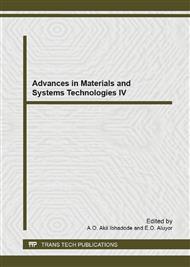p.544
p.553
p.561
p.568
p.579
p.584
p.597
p.605
p.613
Reflections on Technology Transfer between University's Schools of Engineering and Sciences and Industry in Nigeria
Abstract:
University-Industry linkage is a major source by which local technology can be transferred in a country. In order for technology transfer to be effective, the recipient industry must have the right infrastructure and qualified human resources to implement the technology. Recently, issues concerning the low level of technological development and economic advancement in Nigeria have been receiving attention. A survey was recently conducted in order to examine the issues of technology transfer between Schools of Engineering and Sciences in Universities and Industry in Nigeria. The survey was conducted by asking appropriate persons to respond to a set of questions and having interviews with them. The survey revealed that there is a very low level of technology transfer between most industries and universities in Nigeria. In this paper, the reasons for this state of affairs are highlighted and suggestions are made to effectively increase the level of technology transfer and innovation in Nigeria.
Info:
Periodical:
Pages:
579-583
DOI:
Citation:
Online since:
September 2013
Authors:
Keywords:
Price:
Сopyright:
© 2013 Trans Tech Publications Ltd. All Rights Reserved
Share:
Citation:


